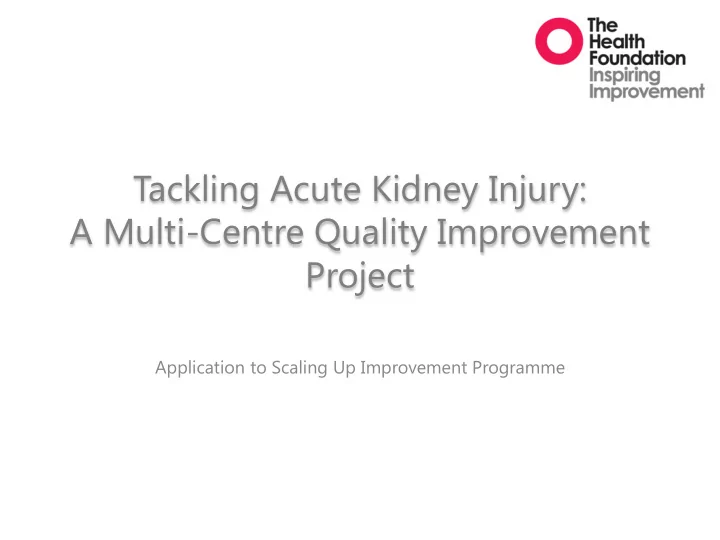

Tackling Acute Kidney Injury: A Multi-Centre Quality Improvement Project Application to Scaling Up Improvement Programme
Why? Lack of awareness about AKI Difficulties in detecting AKI Failure to deliver basic care systematically NCEPOD Report 2009: Adding Insult to Injury
Summary of proposal Electronic detection Education Care bundle programme Selby NM et al. Clin J Am Soc Nephrol. 2012 Selby NM. Curr Opin Nephrol Hypertension 2013 Xu G et al. BMJ Open 2014 Kolhe et al. submitted PLoSONE 2014
http://www.uhl-library.nhs.uk/aki_gp/index.html
http://www.nwyhelearning.nhs.uk/elearning/yorksandhumber/bradfordth/Acute_Kidney_Injury_html/html/index.html
Partners Implementation partners: Lead organisation: Evaluation partner: Dissemination partner:
Implementation
Evaluation plan Centre 1 Centre 2 Centre 3 Centre 4 Centre 5 Design Event Summative Clinical outcomes Baseline 3 months data collection Baseline data ‘Has the introduction of the collection Baseline interventions improved Implement 3 months AKI data standards of basic care and package collection Baseline resulted in better outcomes for data collection patients with AKI ?’ Implement Baseline AKI data 3 months package collection Formative Implement to measure implementation and AKI 3 months package strengthen the project during its Learning event lifespan Post Implement impleme- AKI ntation 3 months package Post data ‘ Can the proposed package of impleme- collection ntation interventions be successfully Post data implemented in the partner impleme- Implement collection AKI ntation 3 months organisations ?’ Post package data impleme- collection ntation ‘Can the delivery of these Post data implemen collection interventions be assessed and -tation 6 months measured ?’ data collection
Systematic literature search • Databases searched: Evidence Based Reviews: The Cochrane Library, DynaMed, Healthcare Databases: MEDLINE, EMBASE, Health Business Elite, HMIC, PubMed, TRIP database Specialist Website: NHS Evidence, RCP , Kings Fund • Search terms: Mesh Text Physicians "*Physicians/px [Psychology]" Clinical Competence "Education Medical Continuing/mt [Methods]" "*Education Medical Continuing/st [Standards]" Patient Care Outcome Assessment (Health Care) Treatment Outcome *Evidence-Based Medicine
Results Changing physician performance. A systematic review of the effect of continuing medical education strategies JAMA. 1995 Sep 6;274(9):700-5. Davis DA 1 , Thomson MA, Oxman AD, Haynes RB. OBJECTIVE: To review the literature relating to the effectiveness of education strategies designed to change physician performance and health care outcomes. DATA SYNTHESIS: 99 trials with 160 interventions that met our criteria. Almost two thirds of the interventions (101 of 160) displayed an improvement in at least one major outcome measure: 70% demonstrated a change in physician performance, and 48% of interventions aimed at health care outcomes produced a positive change. Effective change strategies included reminders patient-mediated interventions outreach visits opinion leaders multifaceted activities Audit with feedback and educational materials were less effective, and formal CME conferences or activities, without enabling or practice-reinforcing strategies, had relatively little impact.
Results GMC commissioned A study to assess the impact of continuing professional development (CPD) on doctors’ performance and patient/service outcomes for the GMC There are a number of examples of CPD contributing directly to patient or service outcomes as part of a wider service improvement project
Need to evaluate the organisational context for success at individual sites, and their improvement expertise Knowing whether or how much context explains differences in • implementation and effectiveness would help make changes and speed up the spread of improvements proven in other settings. Helps determine how robust the intervention actually is. Crucial • difference from controlled trials. Also consider how the intervention can interact and potentially • change the organisation context. Performed as part of base-lining and throughout formative • assessment. Important because of type of intervention we propose may be • affected by organisational/external issues
Evaluation Staffing, size, previous experience and financing in each • organisation Baseline AKI work to date • Level of senior buy in and how this translates into action • Clinical governance and patient safety structures already in • place Engagement with project team, cross section of informants' • views
Evaluation • Surroundings Information Technology • type of LIMS/alerting options set up of admissions units educational facilities • Pragmatic testing PDSA cycles would be enhanced by implementers stating their assumptions about the conditions they need and the steps through which changes might affect outcomes Improvers could learn not just whether a change affected outcomes, but why by making their assumptions explicit ( theories ‘T’) before testing, and revising these after testing (‘T - PDSA- T’ )
Recommend
More recommend